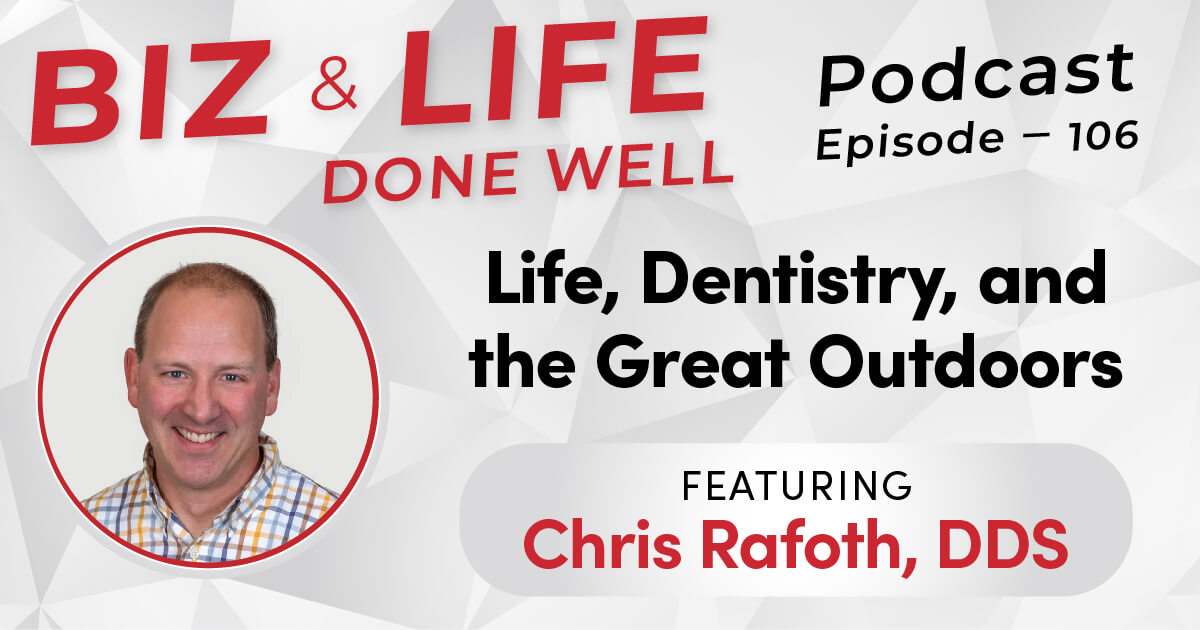Title: Life, Dentistry, and the Great Outdoors: A Chat with Chris Rafoth, DDS
Guest: Dr. Chris Rafoth, DDS
Peter: My guest is Chris Rafoth, DDS. He is the owner of Lions Creek Dental Care. And Chris, where are you located?
Dr. Rafoth: We’re located right at the border between Seattle and Shoreline, just off the I 5 as you aim towards Lake Washington down in the convergence of the Lake Forest Park And Shoreline on Ballinger Way.
Peter: This podcast episode is a long time coming. Chris and I have worked together. We’ve done some marketing for him or a lot of marketing for him when he had another practice. I think we’ve probably interacted for the last nine or ten years maybe?
Dr. Rafoth: Easily ten.
Peter: Yeah. So that was fun. So Chris had a practice in North in Stanwood, Washington, and then after building that practice up, sold that. I think he wanted to be a little closer to home and other things. And now Chris opened new practice.
I actually purchased a practice from Doctor. Bob Feazel and named it, so we got to kinda help with the branding a little bit. You guys came up with the Lions Creek Dental Care, which was genius. Love that.
Dr. Rafoth: Yeah. That was fun.
Peter: And now here we are. So you have had Lions Creek how long have you had that practice?
Dr. Rafoth: It’s going on seven years now. What? Yeah. What? Flies by.
Wow.
Peter: Yeah. Oh my word.
Dr. Rafoth: It must say something about our age. I don’t know. Like, you know, it was like molasses in the beginning. It was just crawling along in in terms of time, but, you know, it’s it must be fun as well because, you know, next thing you know, it’s like, wow. All this happened.
Peter: The the only thing that I can say that we still haven’t managed to go skiing together, which is but we are gonna make that happen.
Dr. Rafoth: Yeah. It’s a it’s a crime that’s gonna be wiped.
Peter: Remedied. Chris, I really wanna have a just a conversation with you about your background and your philosophy, where you see dentistry going and give folks a chance to know a little more about you. And I think you have a bit of a unique approach to dentistry. I wouldn’t say that it’s, you’re just some cookie cutter dentist. You really care about your patients.
And I’m not saying that just, you know, because you’re a client of ours, but I really mean And you. So let’s let’s dive in. So one of the things I’m really interested in is your career choice. You decided to pursue dentistry after getting a bachelor’s of science in marine biology. What can you tell me about that?
Dr. Rafoth: Well, I thought that science was just really captivating to me. I’ve always been sort of a creature of, you know, fascination with whatever sits in front of me. It’s nice to be able to have kids and realize that, you know, some things and I see my son have some of the same kinds of curiosities about the world around. And so when I went to college, if I had to pick something, I was really bad at it at the beginning. And that’s where college shines is that it it opens the doors and you got a million doors you can walk through.
Walked through the art major door first and then I promptly walked right back out the door. Wow. Okay. Chalking. I know.
But then walked right into an English major and decided that I didn’t think I was gonna write poetry for the rest of my life. So I decide I started to dive into these, like, higher level science classes, and they they always remain fascinating to me. So as we went through the motions of getting to the last days of picking up the diploma, there was some fun that came with going out and doing field studies or putting the final touches on, like, thesis for
Peter: Yeah.
Dr. Rafoth: For the graduating paper. And I really just never thought that there was a struggle with how science was always teaching something or allowing you to ask the question, and the answer was there. You just got to take a little adventure on the way to figuring out why things were the way they were, how they work. So that was super satisfying. I never even saw dentistry coming, to be honest.
I I felt like I got to that place about a month before I got the degree. And it was because I had just run into my family dentist. And my family dentist has a family who’s got three sons, and then one of their kids was a colleague of mine growing up through childhood and then into college. And I was hearing about the stories of what that mid middle son was pursuing as a dental degree, and he had already been set up and applied and accepted and all that stuff. And so I just started talking to my family dentist about the nature of that because I had not run into his kids for years.
And he said, you know, the only reason they’re doing it is because they saw me enjoying every step of the way when I had patients in the practice. I said, oh, enjoying every step of the way. Like what are the steps? Like I remember he fixed me up and this became a part of the story of why I thought this was so fascinating because I had fallen off my bike, not really off the bike, but more over the handlebars. And I just I met the asphalt with my face.
Oh. I lost all four of my front teeth. And he he ushered me in the same day with my mom holding my teeth in her hand. And the implied question was, what are you gonna do with these? And I walked out of there with teeth again, and I was fascinated by it.
I didn’t know how it worked exactly. But at 12 years old, I was already thinking about like why that profession was capable of doing what it did. And there was there’s lots of bells and whistles and equipment, and there’s lots of hemming and hawing going on. But at the same time, there’s me and and laying down with my mouth open, getting fixed up. And so we came back to that story as I was graduating and then I realized, you know what?
That’s a cool science. That’s got a lot of things that all coalesce in a way that just allows you to one, figure somebody out from stage zero and progress them to that end stage of being healthier. But it takes a lot of solving puzzles, and you have to understand a little bit about physical chemistry or physiology and how you meet material science with psychology. And it’s an endless permutation of these skills that combine every time you sit down with somebody. So it’s it’s never dull.
And so I thought that’s what I want to go try. And even if it’s not something I find that was really what I had pictured, let’s take a run at it. And I got one chance and I’m glad I took it.
Peter: And where did you do your where did you go to dental school?
Dr. Rafoth: Went to Creighton University in Omaha, Nebraska. Got
Peter: it. Got
Dr. Rafoth: it. Blue days.
Peter: And so you always planned on coming back?
Dr. Rafoth: I did because living in the Midwest for five years amidst six foot snowdrifts and a 100% summer humidity, I didn’t really feel like that was something that was really gonna ground me. I wasn’t growing roots in this environment.
Peter: This is Well, a six foot snowdrift might turn me on if it there was a little elevation.
Dr. Rafoth: Exactly. Yeah. If it’s not on flat land. Yeah. Yeah.
For miles around. Yeah. Yeah. Yeah. So I always knew that my one family so amazingly important as realize that over time.
And also the fact that the environment here is just amazing for doing the things that I really enjoy. So I was never gonna I was never gonna say no to coming back.
Peter: Yeah. What is your philosophy on patient care? I know we could have a conversation and go for a half hour just about that, but just Reader’s Digest version, elevator pitch. We need to put it somewhere on your website. How would you describe your philosophy?
Dr. Rafoth: I open a door to anybody who has a problem to solve in the dental world, and I will bring technology and how do I put this? Technology is an interesting word, but when I can think about the process of technology and and emerging tools in dentistry to solve people’s puzzles. That feeds the philosophy because people will be comfortable enough to share what matters most about their care and where they’re they want to head with that. And I can give them a solution that uses technology to keep them comfortable, uses technology to give them a good quality result that lasts and also makes life easier for everybody in the room. As a provider, there’s certain things that I would certainly never touch with a 10 foot pole if I was an operating provider in the thirties.
It’s been tremendously cool and also really, really productive for patients to get great care in a really efficient, smoother, comfortable way. And I think that is, in summary, the philosophy of giving people a sense of trust and opening up and sharing what it is they wanna do and then getting something that fits for them Mhmm. That is gonna end up as a long lasting result is what I’ve been working on for twenty five years.
Peter: Got it. So what are some treatments, newer type treatments or treatments that you’ve, I wouldn’t say specialized in because I know you you do a lot of things, but what are some more advanced type treatments that you offer?
Dr. Rafoth: We’re working in the digital space in a really cool way with tooth replacement now. So there are things that we have yet to touch that are waiting for patients like really glorified GPS for placing dental implants so that there is absolutely no risk in damaging the surrounding structures when you’re really just trying to focus on replacing one tooth in your head. That isn’t really where I think we shine in terms of using digital modeling and virtual surgery to create a proposed solution for somebody who’s missing teeth. And we can cull from a massive and deep library of tooth shape and size and dimension and bite relationships, and we can create anything. And so we’re doing that on a single tooth scale or we’re doing that on like a full mouth scale.
And it’s it’s something that is just becoming really predictable. And so we’ve we’ve just been committed to that.
Peter: Mhmm. So you are a outdoor enthusiast. Yeah. What what’s your kinda go to or is it just seasonally based? What’s your that’s
Dr. Rafoth: a great question because living here, it’s just like there’s too many things you can go try and dabble in. You can be a you can be a Pacific Northwest decathlete in doing the mud runs or doing the mountain biking, skiing, climbing, all that stuff Yeah. Which in our youth, I’m sure all of us are are given given it a try on every level. But what what I found like I was drawn to was I just I got on a bike and I just started riding it. And it didn’t matter if I was in my basement or maybe I was out in the rain on a muddy trail or I was just doing a long road ride in the summer.
That that became something that now I feel like is so consistent in my life. It’s just it’s something my dad gave me that I I really didn’t realize I enjoyed as much or felt like I could do okay. And whatever you do out there to have activities gotta be a little bit fun. So it’s like, it’s great. You’re flying.
It’s fast. And it’s a crazy fun it’s a crazy fun time. And then there’s lots of gear and equipment that go with it too. And there’s technology in that. So that’s kind of satisfying.
Peter: You can geek out on the gear?
Dr. Rafoth: Oh, you could you could geek out to the tune of tens of thousands of dollars for a single bicycle, but that’s not really where I wanna live. I wanna live where the wheels are spinning, and you’re just outside. You’re just going on for it, and that’s pretty cool. But if I really have to pick a seasonal one, it’s skiing’s amazing. I mean, I love backcountry skiing more now than I used to because I I feel like as I grew up as a kid, the groomers and the chairlift rides were all fine.
And that still has a place, and it’s fun every time you go out skiing. But if there’s something that you can further in in, you know, a trip with me along, it’s gonna be, let’s get out above the trees. Let’s explore a little bit. Let’s find something that somebody doesn’t touch very often, that’s super fun.
Peter: I’m kind of the same way. I never really was a fan of of course I switched, snowboarded, started snowboarding when I was 40 after skiing since I was 13 and then switched back to skiing a couple of years ago when I turned 60. And now that I’m comfortable on skis, it took me a while to get comfortable on skis. And the guys I hang out with are like over the top, they go hard. So just going with them, trying to keep up, and some of the places we’ve gone now are just so much more satisfying than just getting in lap up and down.
Like we were in Some of the stuff we went down was so technical. Was I like, guys, what are we doing here? It was not quite a cliff, but there was one part where I had to like basically slide across a rock for about five feet. I was like, guys, what are we doing?
Dr. Rafoth: And so how did you bounce back to skiing when you get into that position? You’re thinking, snowboarding was pretty cool, but
Peter: Oh, it was easy because I would hang out with my buddies and go on a weekend adventure up at Whistler, and they’re all on skis and I’m on a snowboard, and by the end of the day, I’ve had to unbuckle so many times to keep up with all the places that we’re skating to. It was like, I can’t keep up. Every time you get off the chair, you gotta buckle in and all that. And I just said, you know what? I’m going back.
And I wanted to get back on the bottom of the learning curve a little bit as well. And I got lucky the first year up, I had just bought some old skis just to, I didn’t want to go all in unless I knew I was really going to do it. So I bought these used skis and got some boots and I was riding up the chair at Stevens and I met this guy, Jim, and he had these racing skis on. He looked a little older and I’m like, this guy’s interesting. I go, Hey, have you been to the backside?
We’re just riding up Skyline chair. And I said, Hey, have you been to the backside yet? He goes, I haven’t been, I just got my pass. My daughter bought me a pass. He’s like a senior.
And I said, Well, I’ll go back there with you. And I figured I was going to torch this guy who I find out is 73 or 74 years old. So we go back there and he just completely shreds and he’s got ratty gear on and know, just like the skis are probably like 15 year old race, solemn racing skis. And he became kind of my ski whisperer. So he’s 74 and I mean, the guy still shreds.
The reason that he’s so good, one of the reasons why he’s so good, I mean, he’s skied forever, but also when his kids were of the age to be in racing, he had like three or four kids and he didn’t want to pay like $3 each kid and put them in the racing thing. So he’s like, I’ll take that money and get certified as a race instructor and I’ll start my own team. So he started his own team.
Dr. Rafoth: That’s brilliant.
Peter: Yeah. So that for me running into gym, I mean, we go up, you know, every once in a while now has been my inspiration. And I’m just like, every time I see him, like, you’re my hero. If I’m 74 and on the boards, I’m good. And then we were just up on Tuesday and a friend of ours was with us as well.
He’s 83. Was still going strong too.
Dr. Rafoth: Is fantastic.
Peter: So seeing these guys, it’s like, okay, I now I mean, and I know that it’s keeping up with them is not about part of it is going to the mountain all the time, but the rest of it is taking care of yourself off the mountain.
Dr. Rafoth: Oh, yeah, for sure. Yeah. Stay safe, stay sane, But the thrill is always there.
Peter: It doesn’t
Dr. Rafoth: matter. It doesn’t matter, like, you know, what the skis are. Just it feels amazing.
Peter: I would love to do some back country. We do side country, but I would definitely wanna do some back country stuff.
Dr. Rafoth: Side country and back country can be pretty equivalent. It’s just back to like, did you find this did you find the shot or the slot that made it feel the same?
Peter: And you got to ride the chair back up.
Dr. Rafoth: Yeah. Exactly. And somebody served you a beer at the bottom. Was Exactly. Yeah.
Peter: Looking ahead, what are your future aspirations for Lions Creek Dental Care? How do see the practice progressing and where would you like it to go?
Dr. Rafoth: Like where we ended up, I would just like to carry forth just that same vibe that patients keep coming back for. The only thing that I think I would change is the nature of the just the economic nature of how insurance companies engage what they see as helpful for patients. And that’s something that I think wasn’t there in the genesis of dental care. And as health care evolves, like on the medicine side, so does dentistry. It just lags a little farther behind.
And so as we look at the the big economy of medicine, I feel that it’s important for me with Lions Creek to make sure that the patients are cared for. And that relationship isn’t it isn’t diluted by what an insurance company might influence a patient to decide is the best choice for them to be as healthy as they can be. So that’s a tricky thing, I think that’s something I’d prefer to commit to.
Peter: So I’m guessing you don’t think the CEO of Delta Dental should get $4,000,000 a year in compensation.
Dr. Rafoth: If the trend continues of how insurers try to support patients or dentists, then I don’t think that that $4,000,000 number is appropriate. I think if there is the ability to wind back or maybe unwind this interesting thread of support in corporate interest in how an insurance company or any insurer is gonna thrive in profit. It can’t be at the expense of how people decide how to care for themselves. And so that it that’s gonna be a really tough one to to slam into reverse. I just think that this problem is bigger than any of us at the risk of being too cliche.
It’s it’s something that I think that at its roots, I can just handle with each patient and I have more conversation with them. Again, it’s the thing that we do best. We find that if we can engage each person in a way that makes them trust, that we wanna understand where they’re headed, and we just honest about the fact that nothing is cheap, everything is expensive, and let’s just figure out a way to just do it right, but subtract these these mysterious and kind of arcane spells that insurance companies can put on certain patients about what they think they’re gonna save themselves or what they’re gonna really succeed in utilizing with insurance. That’s where I think the tip of the spear lies.
Peter: That’s good to hear. Yeah. Cool. I really enjoy the conversation today. One last thing I wanted to ask you was, we’ve been talking about Bob Farrell from Farrell’s Restaurant and his analogy of give them the pickle, his rallying cry for customer service.
So thinking about what you do, what would you say is your equivalent of giving them the pickle?
Dr. Rafoth: Without sounding too full of myself, the pickle is And the reason why that is is because I seem to have this ability to just engage anybody who walks in the door in a way that makes them feel comfortable enough to start sharing their own story. And then I’ll be able to segue from hearing or listening to what makes them tick and hear about the problem or the puzzle that they need help solving when their dental health has to be better. And I’m the guy who’s always there. I’m the guy who’s always available and just finds the ability to make those patients say, you know what? This is my guy.
And I just think that’s satisfying for them to know that I’ve got something of a unique skill or tool that I can hand them every time and it’s guaranteed. They’re never gonna be without it. They’re always gonna yeah. I don’t find myself turning that off at the end of the day. It’s just how I’m built.
Peter: That’s the that to me, that’s the essence of giving them the pickles, listening. Chris, thanks again for today. I really appreciate your time.
Dr. Rafoth: You know, I just have to say it’s flattering to just have you pick me out of the group of people you can choose from. You a lot people.
Peter: Story and it’s worth telling.
Dr. Rafoth: It feels awesome. Yeah. Thanks for letting me do it.
Peter: We’ll see you soon. Thank you.
Dr. Rafoth: Thanks, brother.
Peter: Thanks for listening to this episode of Biz and Life Done Well with Peter Wilson. You can subscribe to us on iTunes, Google Podcasts, Spotify, and most of the other popular podcast platforms. Please tell your friends about us and leave us a review so even more people will find out about us. Thanks again. We’ll see you soon.



